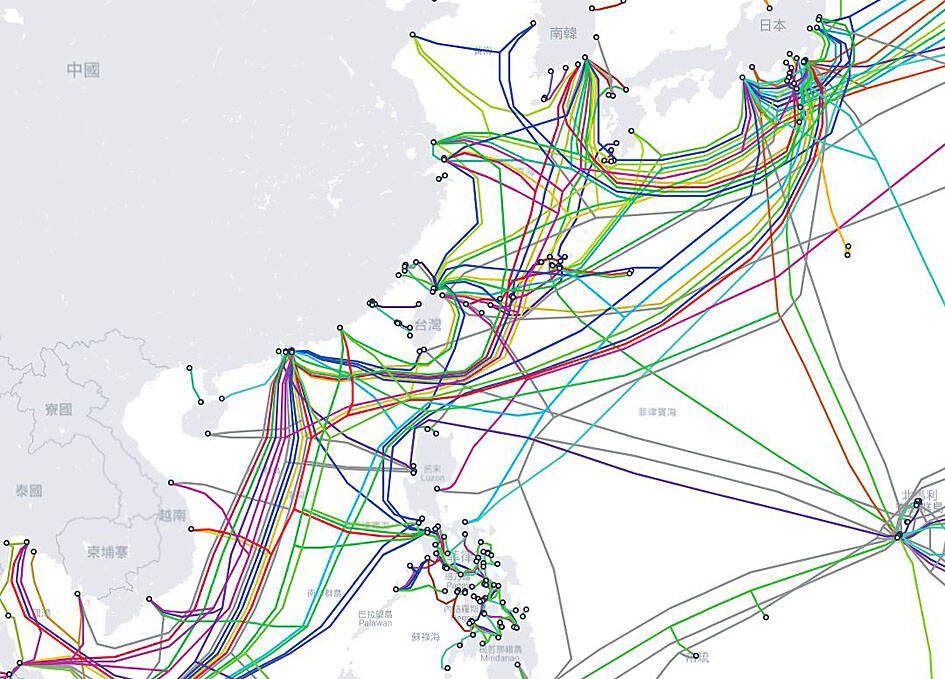Chunghwa Telecom Co yesterday reassured the public that all submarine cables in which it has invested or manages remain fully operational and that the services it provides are unaffected, following online reports of multiple undersea cable failures around Taiwan.
Taiwan’s largest integrated telecommunications operator issued the statement after the Taiwan Submarine Cable Map, an interactive platform that shows the current status and historical incidents impacting Taiwan’s submarine cables, reported several disruptions, the latest on Monday on the EAC2 cable to Southeast Asia.
Other cables reportedly impacted include EAC1 (Hong Kong route), C2C (affecting Hong Kong traffic), RNAL NACS (Hong Kong route), FNAL (Hong Kong-Japan, with no Taiwan landing), F/RNAL NACS (Japan route), and two domestic cables — TWTK2 and TWTP3 (two sections).

Photo: Screen grab from TeleGeography
Chunghwa Telecom said that the EAC2, EAC1, C2C, RNAL and FNAL are not part of its investments and added that all international cables it has funded are functioning normally.
The company also said earlier domestic cable faults under its management had been repaired, including TWTK2 on Jan. 3 and two TWTP3 breaks on May 7 and May 11.
Chunghwa Telecom added that it has invested in more than 14 international cables linking Taiwan and continues to expand with new systems and satellite backups to diversify connections and reduce risk.
Later in the day, the Ministry of Digital Affairs confirmed that three international cables connected to Taiwan — RNAL/FNAL, C2C and EAC1 — have been damaged since July and are awaiting repair, with completion expected between this month and November.
As to the EAC2 cable, the fault occurred on the section between the Philippines and Singapore, while the segment connecting Taiwan to the landing station in the Philippines remains fully operational, it said.
The ministry said that backup routes are in place, ensuring no disruption to Taiwan’s external connectivity.

ALIGNED THINKING: Taiwan and Japan have a mutual interest in trade, culture and engineering, and can work together for stability, Cho Jung-tai said Taiwan and Japan are two like-minded countries willing to work together to form a “safety barrier” in the Indo-Pacific region, Premier Cho Jung-tai (卓榮泰) yesterday said at the opening ceremony of the 35th Taiwan-Japan Modern Engineering and Technology Symposium in Taipei. Taiwan and Japan are close geographically and closer emotionally, he added. Citing the overflowing of a barrier lake in the Mataian River (馬太鞍溪) in September, Cho said the submersible water level sensors given by Japan during the disaster helped Taiwan monitor the lake’s water levels more accurately. Japan also provided a lot of vaccines early in the outbreak of the COVID-19 pandemic,

Kaohsiung Mayor Chen Chi-mai (陳其邁) on Monday announced light shows and themed traffic lights to welcome fans of South Korean pop group Twice to the port city. The group is to play Kaohsiung on Saturday as part of its “This Is For” world tour. It would be the group’s first performance in Taiwan since its debut 10 years ago. The all-female group consists of five South Koreans, three Japanese and Tainan’s Chou Tzu-yu (周子瑜), the first Taiwan-born and raised member of a South Korean girl group. To promote the group’s arrival, the city has been holding a series of events, including a pop-up

TEMPORAL/SPIRITUAL: Beijing’s claim that the next Buddhist leader must come from China is a heavy-handed political maneuver that will fall flat-faced, experts said China’s requirement that the Dalai Lama’s reincarnation to be born in China and approved by Beijing has drawn criticism, with experts at a forum in Taipei yesterday saying that if Beijing were to put forth its own Dalai Lama, the person would not be recognized by the Tibetan Buddhist community. The experts made a remarks at the two-day forum hosted by the Tibet Religious Foundation of His Holiness the Dalai Lama titled: “The Snow Land Forum: Finding Common Ground on Tibet.” China says it has the right to determine the Dalai Lama’s reincarnation, as it claims sovereignty over Tibet since ancient times,

Temperatures in some parts of Taiwan are expected to fall sharply to lows of 15°C later this week as seasonal northeasterly winds strengthen, the Central Weather Administration (CWA) said today. It is to be the strongest cold wave to affect northern Taiwan this autumn, while Chiayi County in the southwest and some parts of central Taiwan are likely to also see lower temperatures due to radiational cooling, which occurs under conditions of clear skies, light winds and dry weather, the CWA said. Across Taiwan, temperatures are to fall gradually this week, dropping to 15°C to 16°C in the early hours of Wednesday